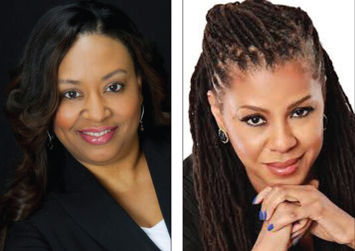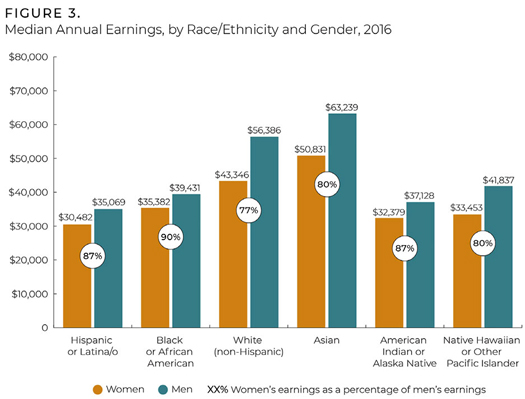Can a sister get paid? Black women at bottom of pay scale
By Barrington M. Salmon -Contributing Writer- | Last updated: Aug 14, 2018 - 9:34:03 AMWhat's your opinion on this article?

Photos: Unsplash.com
|
The wage gap is real and stubbornly persistent, especially for Black women. A study by the American Association of University Women (AAUW), titled “The Simple Truth about the Gender Pay Gap,” finds that the national earnings ratio for all American women is 80 percent. But data from AAUW, the U.S. Census Bureau and elsewhere indicates that on average, Black women were paid 63 cents—or 63 percent —of what White men were paid in 2017.
In other words, it takes the typical Black American woman 18 months to be paid what the average White man takes home in a year.
This is why Dalana A. Brand, Dr. Avis Jones-DeWeever and Nana Tigari Akosua Afiriyie have been working so hard to increase awareness among the general public, and in Dr. DeWeever and Ms. Brand’s cases, advocating for wage and salary parity, as well as helping Black, female clients to be pro-active and smarter about the career choices they make and the salaries they negotiate.

Dalana A. Brand (r) Dr. Avis Jones-DeWeever
|
Ms. Brand, vice president of Global Total Rewards at Electronic Arts, Inc., contends that Black women can’t afford to wait, arguing in an August 7 opinion piece for Blavity, an internet media company, that in the midst of the flurry of publicity, tweets, posts, hashtags and calls for change, one important element is missing.
“What often gets left out of that discussion is that the hallmark day in April does not apply to black women and other women of color,” she said. “This year, August 7 is Black Women’s Equal Pay Day. So, while white women caught up on April 10 of this year, black women must wait for over half the year to pass before our wages catch up to what men made a year ago.”
Ms. Brand, a highly-sought after salary strategist and career transformation coach, said Black women are paid 38 percent less than White men and 21 percent less than White women but “the sad fact is that most people are either unaware or don’t care about the appalling disparity Black women face with respect to pay equity.”
Ms. Brand added that a study by LeanIn.org, which partnered with Survey Monkey and the National Urban League, indicates that a third of Americans aren’t aware of the pay gap between Black women and White men, and half of them don’t know about a similar gap between Black and White women.

|
Much like the feminist movement, Black women are being largely ignored by the equal pay movement,” she added. It is this fact that animates her, said Nana Afiriyie, an Indiana-based clinical social worker.
“White feminists shout about equal pay but say and do nothing about women of color,” she said. “It goes back to the system of racism and goes back to a long history of white women. They have always seen Black women as competitive and have been complicit in our oppression. In the workplace, often, they act as if they still want to be our mistresses. You cannot tell them no or make as much or more money than them. And even when we own our own businesses, we still run into this. I am an independent contractor and many times, they want to pay me less,” said Ms. Afiriyie.
“One way to not get discouraged is you realize how the game is played. You have to get in where you fit in. Look at where there’s a hole and figure out how you can fill it. For example, I see people most don’t want to see, and I take virtual appointments at 3 in the morning. Where I compete, I have to compete differently.”
Ms. Brand drove home the real-world implications of the wage disparity on Black women and their families. According to the National Partnership for Women and Families, median wages for Black women in the United States are $36,227 per year, compared to median wages of $57,925 annually for White, non-Hispanic men,” she stated in her column.
“This amounts to a difference of $21,698 each year. In that same report, the National Partnership of Women and Families also highlighted that if the wage gap were eliminated, on average, a black woman working full time, year-round would have enough money for:
• Two and a half years of child care;
• Nearly 2.5 additional years of tuition and fees for a four-year public university, or the full cost of tuition and fees for a two-year community college;
• 159 more weeks of food for her family (three years’ worth);
• More than 14 additional months of mortgage and utilities payments;
• 22 more months of rent.”
The women point out that Black women sit at the nexus of race and gender and are buffeted by the twin specters of sexism and racism, and struggle upstream against a current of prejudice and bias which is compounded by their gender and race. This intersectional discrimination exacerbates those gender and race gaps, stymies Black women’s ability to access educational opportunities, and has a pervasive and corrosive impact on their careers and career advancement.
“It is such an engrained problem,” said Dr. Jones-DeWeever, who among her many portfolios, mentors and instructs Black women on how to navigate the shoals of business and achieve career and financial success. “The typical Black woman will lose more than $800,000 over their lifetimes and in D.C., the inequality means that Black women could lose more than $1 million.”
“A Black woman has to earn a BA to earn what a White man with a GED would earn,” continued Dr. Jones-DeWeever, a career reinvention strategist, diversity consultant, and women’s empowerment expert. “It’s huge and really hardwired into the system. It’s devastating because with Black college-educated women making as much as 30 percent less than their White male counterparts, that’s a huge disadvantage. That means not being able to put food on the table, buy clothes for your children, not being able to have a better quality of life or diverting money to wealth-building.” Ms. Brand agreed.
“While the gender pay gap is an issue for all women, it is an especially wicked problem for Black women,” she said. “Black women are already economically disadvantaged and face double discrimination (race and gender) within the workforce. The additional burden of a 38 percent pay gap exacerbates the Black wealth gap in America.”
Dr. Jones-DeWeever and Ms. Brand said that as career strategists and salary consultants, there are a number of things that Black women can and need to do to fight back against wage disparities. The first action is for Black women to embrace their power and value and translate that into dollars and benefits during salary negotiations.
“We don’t understand the basics of negotiating,” Dr. Jones-DeWeever said. “We have to understand our value and how to negotiate. When you’re first hired, that’s when you’re most powerful. I never accept the first offer. The first offer is only the beginning of negotiations. You’d be surprised how much money you can get. You have to negotiate for money, a package and vacation.
Black communities must also take other tacks to confront and topple this problem, they said.
“The reality of racism means that Black women will be offered less,” said Dr. Jones-DeWeever. “In terms of fixing it, we have to have conversations about financial literacy and we also have a responsibility to educate our children about their power, worth and value and empowering them.” Ms. Brand concurred.
To date, she said, much of the equal pay movement has been focused on awareness building campaigns and encouraging women to effectively negotiate their salaries.
“While these are important steps, this is only scratching the surface,” Ms. Brand explained. “Getting to pay parity must also involve addressing the corporate systems and state and federal laws that need to change. As Black women we must unify and use our collective voices to push pay equality and the racial wealth gap to the top our agenda. Black women have always been at the forefront of the push for equality in our country, whether it was civil rights or social justice, we have been critical forces for change. The equal pay movement should be no different.”
Ms. Brand and Dr. Jones-DeWeever are called in frequently to consult with Fortune 500 and other companies. They said Black women should also be actively engaged in tackling the equal pay issue within corporate America by participating in employee resource groups at work and collectively guaranteeing that the companies they work for are held accountable for addressing these issues.
Black churches, sororities and fraternities and civil society and community organizations need to actively engage in the political process and pressure elected officials to advance additional laws designed to protect against gender discrimination and pay inequality, they said, and people also need to organize efforts and/or sign petitions to demand to push government to act.
But Nana Afiriyie echoed the trio’s belief that they expect little or no movement or support to come from the White House or Congress, which illustrates the importance of pushing for change on the state and local level.
“With the discrimination this administration promotes and advocates, I think things will get worse before they get better,” she said. “But we’re resilient. I’ve been fighting these people for a long time. We do a great job of making it with very little. Professionals make a penny and those who aren’t professionals make less, but we’re still standing.”
INSIDE STORIES AND REVIEWS
-
-
About Harriett ... and the Negro Hollywood Road Show
By Rabiah Muhammad, Guest Columnist » Full Story -
Skepticism greets Jay-Z, NFL talk of inspiring change
By Bryan 18X Crawford and Richard B. Muhammad The Final Call Newspaper @TheFinalCall » Full Story -
The painful problem of Black girls and suicide
By Charlene Muhammad -National Correspondent- » Full Story -
Exploitation of Innocence - Report: Perceptions, policies hurting Black girls
By Charlene Muhammad -National Correspondent- » Full Story -
Big Ballin: Big ideas fuel a father’s Big Baller Brand and brash business sense
By Bryan Crawford -Contributing Writer- » Full Story






 Click Here Stay Connected!
Click Here Stay Connected!








